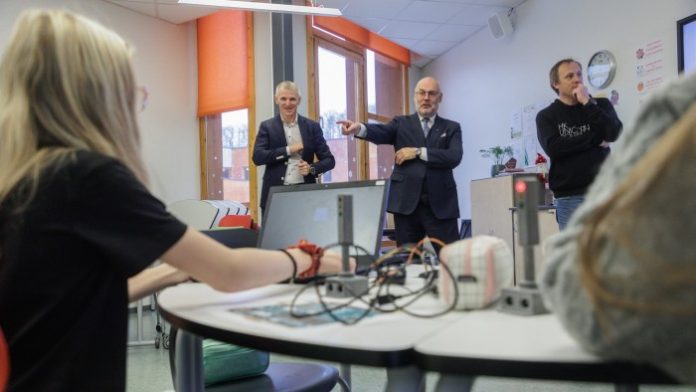Estonia, considered the new centre of European education, regularly encourages students to use smartphones in class, and from September they will be given their own accounts on an AI learning tool.
The small Baltic country with a population of 1.4 million has quietly become the European leader in the Organisation for Economic Co-operation and Development’s Programme for International Student Assessment (Pisa), overtaking its closest neighbour, Finland.
In the latest round of Pisa, conducted in 2022 and published a year later, Estonia ranked first in Europe in mathematics, science and creative thinking, and second after Ireland in reading. Formerly part of the Soviet Union, it now outperforms countries with much larger populations and budgets. Estonia’s success is due to many reasons, but its commitment to all things digital sets it apart. While the UK and other countries are restricting phone use in schools due to concerns that it undermines concentration and mental health, teachers in Estonia actively encourage students to use their phones as a learning tool.
AI learning tools
Meanwhile, Estonia is launching a national initiative called AI Leap, which it says will equip students and teachers with “world-class artificial intelligence tools and skills.” Licensing talks are underway with OpenAI, which would make Estonia a testing ground for AI in schools. The goal is to provide free access to AI learning tools for 58,000 students and 5,000 teachers by 2027, starting with 16- and 17-year-old high school students in September this year. Teachers will be trained in the technology, with a focus on self-learning and digital ethics, as well as prioritising educational equality and AI literacy.
Officials say this will make Estonia “one of the smartest countries using AI, not just the most technologically advanced.” Kristina Kallas, Estonia’s Minister of Education and Science, said during a visit to London this week for the World Education Forum:
“I know the scepticism and carefulness of most of the European countries regarding screens, mobile phones and technology. The thing is that in the Estonian case, society in general is much more open and prone to using digital tools and services. Teachers are no different.”
No bans on mobile phones
Kallas also said there are no bans on mobile phones in Estonian schools. On the contrary, smartphones are seen as an integral part of Estonia’s highly successful digital education policy.
“To be honest, I haven’t heard of any problems,” she said. “Schools set rules that are followed at the local level. We use mobile phones for educational purposes. We have local elections coming up in October. Sixteen-year-olds can vote in local elections, and they can vote online using their mobile phones. So we want them to use mobile phones to fulfil their civic duty, participate in elections, obtain information, and analyse political platforms. It would be a bit strange if we didn’t allow them to use them at school, in an educational environment. It would send a very confusing message to 16-year-olds — vote online, vote on your mobile phone, but don’t use ChatGPT on your phone for learning,” she noted.
Kallas clarified that the use of phones in schools is regulated by the schools themselves so that “mobile phones are not used during breaks, but are used in class when the teacher asks students to take out their phones because there is a task or exercise that can be done using phones.”
AI revolution in Estonia
Instead of resisting new technologies, Estonia embraced them. In 1997, huge investments were made in computers and network infrastructure as part of the Tiigrihüpe (Tiger Leap) programme. All schools were quickly connected to the internet. Now smartphones and AI are seen as the next step.
Kallas talks about an AI revolution that will bring an end to essays for homework, say goodbye to the “memorise/repeat/apply” model of learning that has been relied on for hundreds of years, and move towards oral exams. The challenge is to develop higher cognitive skills in young people, as AI can do everything else better and faster. “We will either evolve into faster-thinking, higher-level thinking beings, or technology will take over our consciousness,” the minister said.
